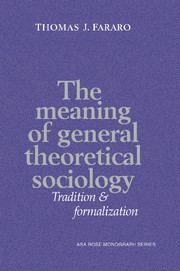Book contents
- Frontmatter
- Contents
- List of Figures and Tables
- Preface
- Introduction
- Chapter 1 A philosophy of general theoretical sociology
- Chapter 2 Dynamical social systems and the key problems
- Chapter 3 Action theory and social order
- Chapter 4 Structuralism and unification
- Summary
- Notes
- References
- Index of names
- Index of subjects
- Other books in the Arnold and Caroline Rose Monograph Series of the American Sociological Association
Preface
Published online by Cambridge University Press: 10 December 2009
- Frontmatter
- Contents
- List of Figures and Tables
- Preface
- Introduction
- Chapter 1 A philosophy of general theoretical sociology
- Chapter 2 Dynamical social systems and the key problems
- Chapter 3 Action theory and social order
- Chapter 4 Structuralism and unification
- Summary
- Notes
- References
- Index of names
- Index of subjects
- Other books in the Arnold and Caroline Rose Monograph Series of the American Sociological Association
Summary
The main objectives of this book are to set out a conception of a comprehensive research tradition I call general theoretical sociology and to show how key problems in this field are defined and studied in formal terms. The Introduction presents an overview of the topics treated in sequential terms in four chapters: a philosophy of general theoretical sociology, a dynamical systems formulation of its main problems, formal studies in action theory and social order, and integrative theory construction centered on the analysis of social structure in network terms.
This work represents two tendencies in my thinking emerging over the past decade. On the one hand, there is a continuity of past and present, of traditions in sociological theory. Despite the pluralism, I have come to regard the various traditions as communicating branches of one comprehensive tradition to which each generation makes its contributions. On the other hand, theoretical advance is through a unification dynamic. It is not that some static state of integrated sociological theory, wiping out disagreements, is envisioned. The commitment is to a recursive process of unification of otherwise separate contributions. This can occur at a variety of levels and in diverse ways, involving metatheory, principles, and theoretical procedures, a number of which are discussed and exemplified in this book.
Two overall elements of orientation inform the approach taken in this book. First, I treat the vast body of work of the past and present of sociological theory as a compound of general theoretical analysis, world-historical analysis, and normative analysis.
- Type
- Chapter
- Information
- The Meaning of General Theoretical SociologyTradition and Formalization, pp. ix - xiiPublisher: Cambridge University PressPrint publication year: 1989

